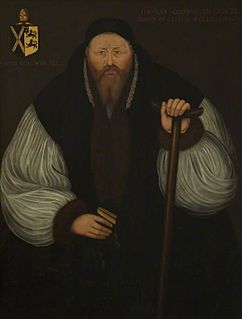Related Research Articles

John Feckenham, also known as John Howman of Feckingham and later John de Feckenham or John Fecknam, was an English churchman, the last abbot of Westminster.
John Ponet, sometimes spelled John Poynet, was an English Protestant churchman and controversial writer, the bishop of Winchester and Marian exile. He is now best known as a resistance theorist who made a sustained attack on the divine right of kings.

Thomas Godwin was an English bishop, who presided over the Diocese of Bath and Wells.
George Day was the Bishop of Chichester.
Henry Cole was an English Roman Catholic churchman and academic.
John White was an English bishop, a Roman Catholic who was promoted in the reign of Mary Tudor.
John Harpsfield (1516–1578) was an English Catholic controversialist and humanist.
William Kingsmill alias William Basyng was Prior of the Benedictine St. Swithun's, Winchester until the Dissolution of the Monastery in 1539. He was appointed as the first Dean of Winchester Cathedral at the foundation of the new chapter in 1541.

John Young (1514–1580) was an English Catholic clergyman and academic. He was Master of Pembroke Hall, Cambridge, and was later imprisoned by Elizabeth I. He is not John Young (1534?–1605), Master of Pembroke Hall later in the century, and afterwards Bishop of Rochester.
Nicholas Robinson was a Welsh bishop of Bangor.
Richard Cheyney was an English churchman, bishop of Gloucester from 1562. Opposed to Calvinism, he was an isolated and embattled bishop of the reign of Elizabeth, though able to keep his see.
William Chedsey (1510?-1574?) was an English Roman Catholic and academic, archdeacon of Middlesex in 1556 and President of Corpus Christi College, Oxford in 1558.
Richard Turner was an English Protestant reformer and Marian exile.
Lancelot Ridley, was an English clergyman, known as a theological writer, and rector of St James' Church, Stretham, Cambridgeshire.
John Véron was a French Protestant controversialist and preacher, known for his activities in England.

David Whitehead (1492?–1571) was an English evangelical priest, a Marian exile and author.
Sylvanus Scory was an English courtier and politician, known as a soldier, covert agent, and dissolute wit.
Alban Langdale or Langdaile was an English Roman Catholic churchman and author.
References
- ↑ Oxford Dictionary of National Biography
- ↑ Gee, Henry (1898). The Elizabethan Clergy and the Settlement of Religion, 1558–1564. Oxford: Clarendon Press. pp. 156–161.
- ↑ "Scory, John (SCRY539J)". A Cambridge Alumni Database. University of Cambridge.
- 1 2 3 4 5 6 7 8 9 . Dictionary of National Biography . London: Smith, Elder & Co. 1885–1900.
- ↑ Aubrey's Brief Lives, ed. Oliver Lawson Dick, 1949
- ↑ Notes & Queries, 7th series, VIII, 6 July 1889; A. T. Bannister, English Historical Review, April 1928
Attribution
![]()
| Church of England titles | ||
|---|---|---|
| Preceded by John Ponet | Bishop of Rochester 1551–1552 | Succeeded by Maurice Griffith |
| Preceded by George Day | Bishop of Chichester 1552–1553 | Succeeded by George Day |
| Preceded by Thomas Reynolds | Bishop of Hereford 1559–1585 | Succeeded by Herbert Westfaling |